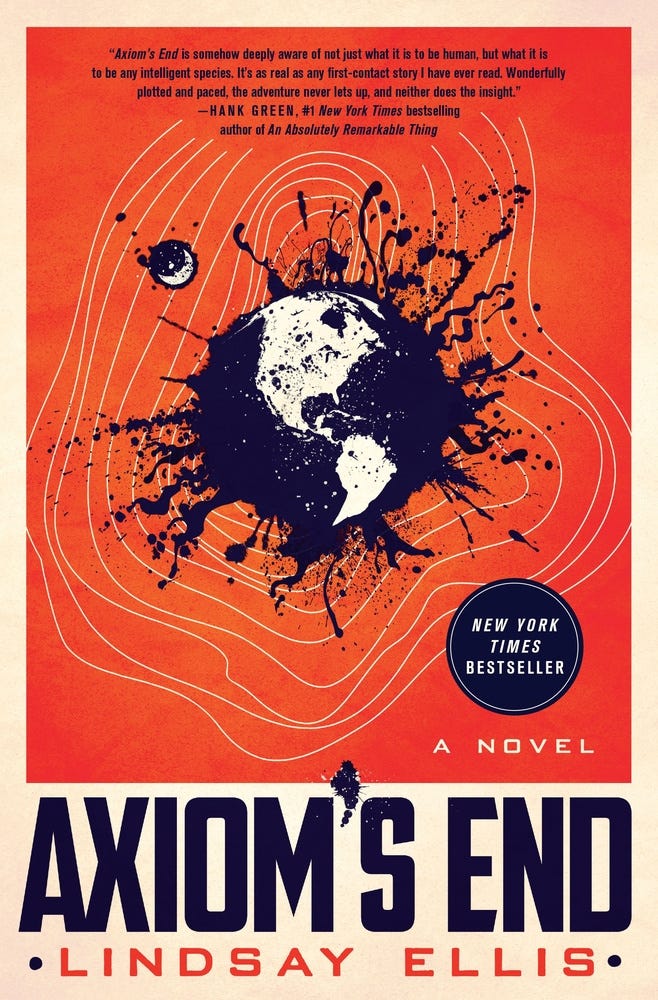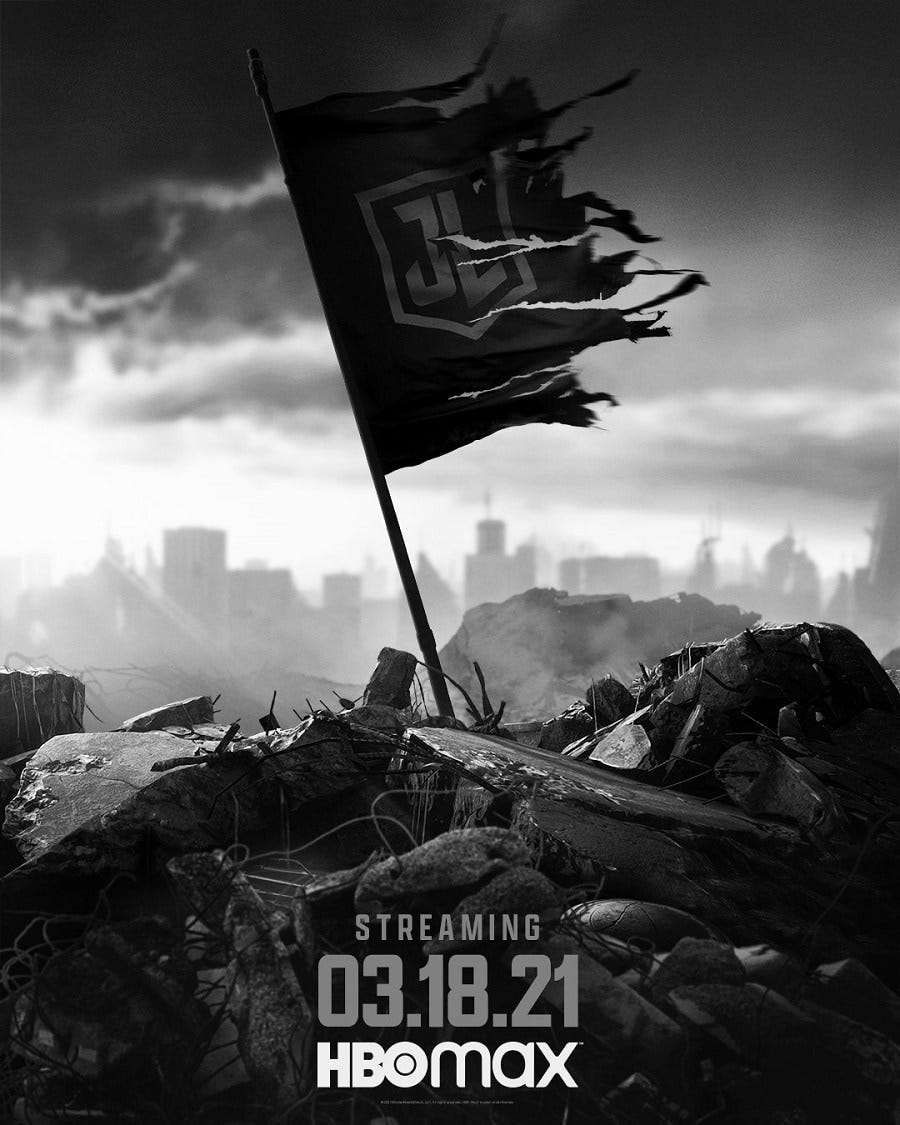On Zack Snyder and Adaptations
Recently, I wrote about Zack Snyder for the first time in quite a while, and the response has been pretty good. Getting into the weeds of the Snyder phenomenon got me thinking about a lot of the issues that swirl around the controversial filmmaker's oeuvre, and one thing keeps circling back around in my brain: the way Snyder makes adaptations his own...for good or ill.
With 300, Snyder took a story with pretty fully-formed visuals, created by an artist he clearly admires (Frank Miller), and made it his own in a very simple way: he added boundless kinetic energy, a heightened, almost campy visual flair inspired by music videos, and a healthy sprinkling of slow motion in the moments where he really felt like he needed a single image to "pop."
(There's a whole other essay to be written about the way Snyder's comic book adaptations are inspired by static images from the source material, and his love for recreating and centering those images.)
With both 300 and Watchmen, Snyder's obvious reverence for the source material created immediate schisms within groups of fans and reviewers. Was he too obsessed with recreating things he loved, and not putting enough thought into making them his own? That critique -- that he was too obsessively loyal to the source material -- didn't last long, though.
Watchmen was a particularly interesting film, because while vocal critics mocked Snyder for copying direct images and passages from the comics, he was also accused of misunderstanding some of Alan Moore and Dave Gibbons's satire, and lambasted for changes made the the comic's ending.
Much of the discourse around Man of Steel isn't actually about Man of Steel. It's Superman Discourse, recast as discourse about Man of Steel because Man of Steel is, after all, a Superman movie.
That's actually an interesting idea to interrogate a little, because I can compare and contrast it with my personal experiences watching Batman v Superman: Dawn of Justice, and come away with some fundamental contradictions about adaptations broadly, and Zack Snyder's adaptations more specifically.
Many of the biggest critiques of Man of Steel come from people who already have preconceived notions of who Superman is, and how he should act. That isn't said to invalidate their criticism, but it's just objectively true that some of the things that got critics and audiences most annoyed -- Jonathan Kent saying "maybe" Clark should have sacrificed people to protect his secret, and Clark choosing to kill Zod at the end -- aren't problems with the movie in the strictest sense.
The movie, as a whole, hangs together fairly well, and those issues aren't "issues" so much as they are creative decisions. You can agree with them or not, but it feels self-evident that many people only disagree with them because they're watching a Superman movie, and the characters are acting in ways that don't gel with their interpretation of Superman.
For example, the depiction of a hero killing the main villain (particularly during an alien and/or military invasion) is not uncommon in big tentpole films, and not something that would normally prompt a moral panic in the audience. It did, because Superman is Superman.
Jonathan Kent's implied decision to put his son above the fate of the world is only incongruous with his morals if you have some idea of what Jonathan Kent's morals are -- something that's absent in Man of Steel prior to that point, since we start with an adult Clark and don't spend a ton of time with his parents. In a vacuum, both of these moments are just story decisions, and morally neutral. You could even argue that the latter was a story decision motivated by, and consistent with, the rest of Jonathan's actions in the movie.
In the theatrical version of Batman v Superman: Dawn of Justice, there were a number of minor plot holes and inconsistencies created by some major story elements being lost in the edit.
The film's Ultimate Cut reveals that Superman' didn't really cause an African village to be wiped out, and that Luthor bribed someone to testify that he did. That same cut of the film also shows you how Batman got his hands on Kryptonite (he stole it from Luthor). I remember that during my initial viewing of the movie, I caught things that implied both of these facts. Confronted with these shortcomings by a friend, I told him that they didn't bother me, because my mind filled in the blanks based on comic book logic.
My friend, who hated the movie, argued that the movie should be able to stand on its own, and that it shouldn't need an understanding of the comic books to connect the dots and make it coherent.
That isn't untrue, but it isn't fully true, either. Because adaptations like this are strange animals.
Hardcore fans of Zack Snyder would love for you to forget all about the shoddy editing on Batman v Superman and accept (and interpret) that film's intentions while simultaneously shouting down fans who criticize Man of Steel based on their personal expectations for Superman.
Snyder's loudest critics would argue that Batman v Superman is a weak film because it relies on audience members drawing their own conclusions (sometimes based on decades of comics)...while grousing the the Clark Kent of Man of Steel "doesn't act like Superman" enough.
I think both halves of both of these statements have some value and some heft. But I think they're wielded clumsily in both cases and both groups of fans are going out of their way to avoid dealing with the complexity of the issue.
There is certainly a balance to making an adaptation. Too much fidelity to the source material, and you're left with a movie that feels flat because movies work differently than other forms of art. In the Snyder canon, it's Watchmen that is most often accused of this. Too little fidelity to the source material, and it becomes harder to recognize as the source material, leading to backlash on the part of the hardcore fans that studios rely on to push a fan-driven movie. I'll let you decide what you think that is, but it arguably applies to anything Snyder has made with Superman in it.
The thing is, it isn't unfair to insist that movies should stand on their own and be accessible to fans who haven't got a degree in the source material. Every piece of art should, at least in theory, stand on its own without needing a ton of outside context to make it "work."
On the other hand, that isn't how the human brain, or art, works in general. Outside context informs how we react to art. This is doubly true in serialized, franchise storytelling. Since the 1990s, things have changed so much in mainstream American comics that it is now rare for a single monthly comic book to be a self-contained, satisfying piece of entertaining if you don't have context for the story surrounding it.
Watchmen as a concept only really works when the audience has an understanding of the tropes of superhero storytelling. The story itself is fine, but the comic is considered a masterpiece because of the underlying commentary, not because of the plot. Christopher Nolan recently chimed in to say the movie was unfairly maligned upon release, because without something as mainstream as the Marvel Cinematic Universe, many fans didn't really "get" what Watchmen was doing.
“I’ve always believed Watchmen was ahead of its time,” Nolan told THR. “The idea of a superhero team, which it so brilliantly subverts, wasn’t yet a thing in movies. It would have been fascinating to see it released post-Avengers.”
One could similarly argue that the two main texts being adapted for Batman v Superman don't work -- or at least lose a lot of their narrative and emotional heft -- when separated from the concept of an ongoing superhero universe in which dozens of stories have already been told. Those stories -- Batman: The Dark Knight Returns and The Death of Superman -- both rely heavily on the complex mythologies of the characters in question.
[That doesn't mean there's no emotional heft. After treating Man of Steel like a "First Contact" story, Superman's sacrifice at the end of Batman v Superman feels a lot like the moment in Lindsay Ellis's Axiom's End, when Ampersand puts himself in between his own race and the human characters, a willing sacrifice. That was an emotionally affecting sequence, but not in the same way as Superman #75, when Jurgens was able to weave a montage featuring a decade's worth of supporting characters reacting to Superman's loss.]

So, where does this leave us?
Snyder is a filmmaker who is clearly on the lookout for big moments. Whether it's "This is Sparta!" or the introduction of Wonder Woman in Batman v Superman, Snyder is at his best when the volume is cranked all the way up to 11 and the knobs are pulled off.
Not every character is well-suited for that style of storytelling, and one could argue that a character like Superman often works best in quiet moments.
Obviously it would be preposterous to say Superman doesn’t work in big, epic moments. It’s what the character is built on — Faster than a speeding bullet! More powerful than a locomotive! Able to leap tall buildings in a single bound! — but those are only a small part of who Superman is.
While I liked Man of Steel quite a lot, it’s difficult to argue that the original sin of the “DC Extended Universe” wasn’t its use of Superman. More than any other character in comics, Superman is a symbol. The farther your interpretation of Superman gets from audience expectations, the more difficult it is to fully sell your adaptation — even if the movie is good.
You can support me on Patreon for just a dollar here.
Other great comics folks to support:
Other recent stories to check out from Russ Burlingame:
Josie and the Pussycats Directors Return to Feature Films With "Guys With No Friends"
Bruce Springsteen Just Announced A Box Set That Will Recontextualize His Whole Legacy


